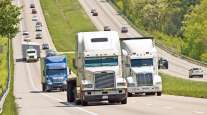Senior Reporter
Trucking Stakeholders Offer Suggestions to FMCSA for Large-Truck Crash Study

[Stay on top of transportation news: Get TTNews in your inbox.]
Trucking industry trade groups and other stakeholders have made a variety of suggestions to federal trucking regulators about how they should design and conduct a new major study to identify factors contributing to reportable large-truck crashes.
Such trucking trade groups as American Trucking Associations, the Commercial Vehicle Safety Alliance and the Insurance Institute for Highway Safety said they support an update to the agency’s Large Truck Crash Causal Factors Study. FMCSA based its prior major crash study on data collected from 2001-2003, presenting its final report to Congress in 2006.
Drivers — who filed a majority of the 160 comments submitted — charged that inattentive passenger-vehicle drivers and some aspects of federal hours-of-service requirements for truckers also are having an impact on highway safety.
FMCSA Large Truck 2020 00557 by Transport Topics on Scribd
“Methodologically, the agency seeks information on how best to balance sample representativeness, comprehensive data sources, ranges of crash types and cost efficiency,” FMCSA’s Federal Register post said. “The methodology should also address the use of onboard electronic systems, which can generate information about speeding, lane departure and hard braking.”
“Given macro-level changes in technology, road user behavior and safety, ATA applauds the agency for endeavoring to create a new LTCCFS,” ATA said. “An updated [study] presents the opportunity to modernize and expand on the methodology from the last study, capture new data elements, and increase the overall reliability and validity of its findings.”
ATA added, “It will be incumbent upon the agency to listen to the voice of the trucking industry to garner the support and collaboration necessary to produce robust and valid findings. National representativeness and stakeholder engagement should be chief among its concerns.”
“As the FMCSA undertakes a new LTCCFS, the agency must drastically improve upon the failed structure and methodologies of the initial Large Truck Crash Causation Study conducted in 2001-2003,” OOIDA said in comments. “Various industry stakeholders, such as OOIDA and the Transportation Research Board, repeatedly voiced concerns regarding significant shortcomings in the [study’s] approach, organization and presentation of results.”
“Although the underlying cause of most crashes is already known to be driver behavior, as recognized in the initial LTCCS, new data will allow analysis on the changes in driver behavior since its completion,” the Commercial Vehicle Safety Alliance said. “These changes in technology have completely shifted the way people communicate, consume information and drive. Due to the diversity of freight, roadways, road conditions, weight limits on commercial motor vehicles, distracted and drugged driving laws, and environmental factors throughout the United States and in rural and urban areas, CVSA supports a broad and diverse sample size across the U.S.”
The Insurance Institute for Highway Safety encouraged FMCSA to specify and prioritize its research questions and use those to guide study design, pursue a representative sample, consider oversampling certain crash situations worthy of further study, collect a control sample and include extensive photographs for every crash.
“This study is an opportunity for FMCSA to increase knowledge and improve safety,” the institute said.
Compare each of the presidential candidates' plans for addressing America's infrastructure needs. See our Candidate Infrastructure Tracker.
Mecanica Scientific Services, a forensic engineering firm, said it believes it will be important to maintain consistency with the previous study to make reliable comparisons and leverage past collected data.
“Additionally, it is our research team’s belief that thought and consideration of including event data recorders sourced data sets from the medium- and heavy-duty trucks, truck-tractors, and buses must be included,” Mecanica wrote.
Truck driver comments overwhelmingly expressed concerns that federal hours-of-service and electronic-logging requirements had a downside as it relates to safety — an observation that federal regulators have said are not supported by data.
Other negative factors such as the closure of rest areas, shipper and receiver holdups, and dispatchers and brokers putting pressure on drivers were having a negative impact on safety, drivers said.
“I am not sure that there is a way to study the time pressure that all drivers are under with the ELDs, but I do think that should be included in the new study,” wrote Shaun Robison of West Jordan, Utah. “I also think that you should take a hard look at any noncommercial drivers involved. I think the public is undereducated on how to drive around commercial vehicles, and that needs to be looked at as part of all accidents involved in the study.”
Want more news? Listen to today's daily briefing:




